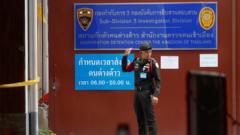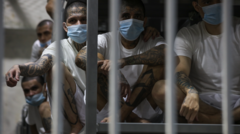Despite international outcry, Thailand has confirmed the deportation of at least 40 Uyghurs to China, raising significant human rights concerns as rights organizations warn about potential torture and persecution awaiting them.
Thailand's Controversial Deportation of Uyghurs Raises Human Rights Concerns

Thailand's Controversial Deportation of Uyghurs Raises Human Rights Concerns
The Thai government has sent 40 Uyghurs back to China amidst fears of severe consequences for the deportees.
At least 40 Uyghurs have been forcibly deported from Thailand to China, igniting widespread condemnation from human rights advocates who fear they face torture and even death upon their return. The Thai government confirmed the deportations occurred on Thursday, despite earlier reassurances that the group would not be sent back, a stark reminder of the ongoing tensions regarding human rights issues in the region.
The group reportedly flew back to Xinjiang after spending a decade in a detention center in Bangkok, where conditions were criticized as unsanitary and overcrowded. The Thai authorities have faced criticism for their handling of the situation, particularly since it marks the first time the nation has deported Uyghurs since 2015. Concerns have been voiced by the United States, United Nations, and various human rights organizations following the deportations, which were conducted under a veil of secrecy.
Thai media reported that several trucks left the immigration detention center with their windows obscured, and subsequent tracking indicated an unscheduled flight departing to Xinjiang. Despite claims from China that the individuals deported were mere illegal immigrants, there has been no confirmation acknowledging their status as Uyghurs, a minority group facing persecution in China.
Critics, including opposition lawmakers in Thailand, have condemned the government for what they describe as a serious violation of human rights laws. The facility where the Uyghurs were held has gained notoriety for its poor conditions, with reports of five detainees dying while in custody. Human Rights Watch highlighted the potential dangers awaiting them, including torture and long-term imprisonment.
Thai Prime Minister Paetongtarn Shinawatra was reticent when initially questioned about the deportations, affirming that laws and human rights principles must be upheld universally. Still, the actions of her government have drawn sharp rebuke from the international community, underscoring a growing concern over Thailand's commitment to human rights.
As approximately 12 million Uyghurs, primarily Muslim, reside in Xinjiang, reports of mass migration and cultural suppression continue to surface. The Chinese government has been accused of eradicating Uyghur culture while enforcing strict religious controls in the region. The recent deportations illuminate the fraught geopolitical dynamics surrounding the Uyghur situation, raising questions about the future of human rights and the fate of marginalized groups in the region.




















